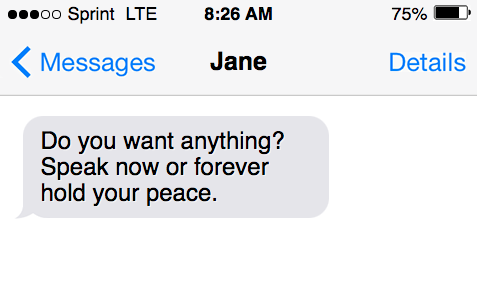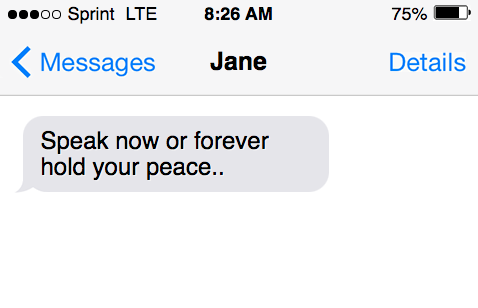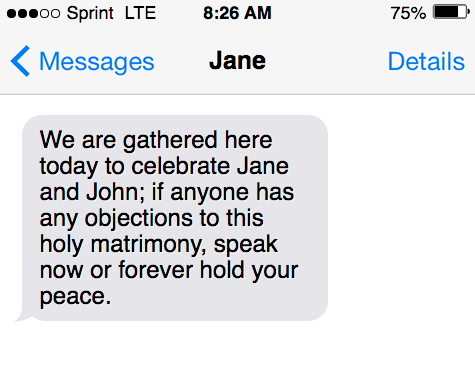“Speak now or forever hold your peace” is a sentence that is often heard at Christian wedding ceremonies. That means any individual can address any objection to the union.
But is this realistic or only part of movies? Does anyone object to the union of bride and groom in reality?
Let’s find out the origins behind the use of this idiom/phrase on wedding days and its relevance to current times.

What does the idiom “speak now or forever hold your peace” mean?
The basic meaning associated with the sentence is that “if any present person has any objection to the wedding, he or she should speak up.”
This is a kind of question that is addressed to the audience directly. It is a way of asking if anyone has any objection to the couple’s wedding.
If anyone disagrees with the relationship, that person may speak his or her mind. “Holding the peace” for “the future” means that you are happy with the wedding of the bride and the groom. And will not have any future objection.
Keeping quiet is a nod for moving ahead with the wedding ceremony with no interruption expected from the audience.

Origins of the idiom
Though movies and TV shows theatrically present this idiom, the origin of this idiom does not have any kind of drama attached to it. Its origin dates back to Medieval times.
Marriage liturgy section
The Christian church coined this phrase to provide time in the wedding ceremony in order to see if there are any legal issues with the marriage. This helped people to recognize if there were any extramarital unions. It comes from the Book of Common Prayer, first published in 1549.
In elder years, wedding news was announced a few weeks (typically three consecutive Sundays) before the ceremony to leave out any chance of legal or social disturbances.
Saying the idiom in advance and during the wedding ceremony gave the audience a final chance to address any legal issue(s) associated with the wedding ceremony.
You can find the detailed history of this idiom and associated wedding liturgy in the Christian Book of Common Prayers.
This idiom was used as a method to make marriages legal centuries ago. Modern couples are now provided the option to edit their wedding vows and leave this idiom out if they prefer. Although, it’s common for it to be part of the ceremony as a type of tradition.

Is it “peace” or “piece?”
There is a difference between using the words “peace” and “piece.” And the use of the words in this idiom.
You say your “piece” when you want to speak your mind. You hold your “peace” if you are going to keep quiet.
The wedding officiant speaks the idiom at Christian wedding ceremonies to provide an opportunity for either of these responses to the idiom.
It means if anyone objects to the marriage, he or she may speak during the ceremony. Otherwise, they are expected to remain quiet and give a silent nod to the wedding ceremony to go on.
Technically both “piece” and “peace” are correct in their own ways. Although, the idiom is correctly spelled, “speak now or forever hold your peace.”
What does it mean at a wedding when someone says the idiom?
The idiom has continued to be used by modern couples due to tradition. Weddings have taken place in religious institutions since for hundreds of years.
Many couples adhere to the classic rules set by their forefathers during this special ceremony. This is a way for wedding couples to respect tradition.
In modern times, many weddings are still held at churches; thus, the priest says this idiom to keep the ancient tradition alive.
The idiom used to have the significance of objecting to the wedding in ancient times, but now its meaning is not taken literally.
To avoid any kind of religious glitch, many couples are now deciding to omit the idiom from their wedding vows. Many couples are also choosing a different wedding venue than a church.
Can you object to a wedding using this idiom?
The idiom has become more like a traditional part of the wedding vow.
No one really takes the meaning of the idiom literally. It is an unspoken rule that if any audience member has any kind of grievance with the wedding couple, it should be spoken privately.
Announcing the wedding ceremony is not considered acceptable in the present times as the idiom is just a formality in the wedding vows.
Many wedding experts have said that they hardly see any objection during the wedding ceremony unless either member to get married is already married and has not taken a divorce.
Using the idiom during the ceremony has become more of a way of joking and making the atmosphere light during a wedding ceremony.
Examples of use in modern wedding ceremonies
- “We are gathered here today to celebrate Jane and John; if anyone has any objections to this holy matrimony, speak now or forever hold your peace.”
- “If anyone has any issues with this wedding, speak now or forever hold your peace.”
Common questions
Common questions about prayer, English, and idioms.
Is “speak now or forever hold your peace” said in a Catholic church?
Most churches that repeat this idiom during weddings are Christian in faith. Although, multiple religious groups have embraced the more recent positive spin that the idiom has taken.
Is “speak now or forever hold your peace,” said in real life?
While the phrase has received its dramatic moment in movies and TV shows, it is typically said during real-life ceremonies.
Initially, the idiom was used by the British Empire to provide a legitimate objection to a nuptial. Typically, a marriage was announced many weeks before the ceremony to allow the objection to occur. Today, it is part of common prayer in a modern wedding ceremony.
Sources
- hold one’s peace – Wiktionary
- The History Behind “Speak Now or Forever Hold Your Peace”
- compound imperative – Wiktionary
- June 21 – Speak Now or Forever Hold Your Peace – FaithBites
- Speak Now or Forever Hold Your Piece – Wikipedia
Inside this article
Fact checked:
Content is rigorously reviewed by a team of qualified and experienced fact checkers. Fact checkers review articles for factual accuracy, relevance, and timeliness. Learn more.
Core lessons
Glossary
- Abstract Noun
- Accusative Case
- Anecdote
- Antonym
- Active Sentence
- Adverb
- Adjective
- Allegory
- Alliteration
- Adjective Clause
- Adjective Phrase
- Ampersand
- Anastrophe
- Adverbial Clause
- Appositive Phrase
- Clause
- Compound Adjective
- Complex Sentence
- Compound Words
- Compound Predicate
- Common Noun
- Comparative Adjective
- Comparative and Superlative
- Compound Noun
- Compound Subject
- Compound Sentence
- Copular Verb
- Collective Noun
- Colloquialism
- Conciseness
- Consonance
- Conditional
- Concrete Noun
- Conjunction
- Conjugation
- Conditional Sentence
- Comma Splice
- Correlative Conjunction
- Coordinating Conjunction
- Coordinate Adjective
- Cumulative Adjective
- Dative Case
- Determiner
- Declarative Sentence
- Declarative Statement
- Direct Object Pronoun
- Direct Object
- Diction
- Diphthong
- Dangling Modifier
- Demonstrative Pronoun
- Demonstrative Adjective
- Direct Characterization
- Definite Article
- Doublespeak
- False Dilemma Fallacy
- Future Perfect Progressive
- Future Simple
- Future Perfect Continuous
- Future Perfect
- First Conditional
- Irregular Adjective
- Irregular Verb
- Imperative Sentence
- Indefinite Article
- Intransitive Verb
- Introductory Phrase
- Indefinite Pronoun
- Indirect Characterization
- Interrogative Sentence
- Intensive Pronoun
- Inanimate Object
- Indefinite Tense
- Infinitive Phrase
- Interjection
- Intensifier
- Infinitive
- Indicative Mood
- Participle
- Parallelism
- Prepositional Phrase
- Past Simple Tense
- Past Continuous Tense
- Past Perfect Tense
- Past Progressive Tense
- Present Simple Tense
- Present Perfect Tense
- Personal Pronoun
- Personification
- Persuasive Writing
- Parallel Structure
- Phrasal Verb
- Predicate Adjective
- Predicate Nominative
- Phonetic Language
- Plural Noun
- Punctuation
- Punctuation Marks
- Preposition
- Preposition of Place
- Parts of Speech
- Possessive Adjective
- Possessive Determiner
- Possessive Case
- Possessive Noun
- Proper Adjective
- Proper Noun
- Present Participle
- Prefix
- Predicate



